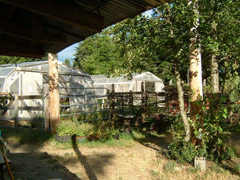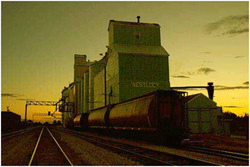
Mapping Results, Reports & Papers
The BC-Alberta Social Economy Research Alliance's (BALTA's) mapping program will continue from 2008 until 2011, including an online survey to profile social economy organizations in Alberta and British Columbia, Canada. The online survey was launched in January 2008. Two reports and a conference paper on results to date from the survey have been produced:
Summary of Preliminary Results: BALTA Social Economy Survey – Spring 2008 – Covers results from January to April 2008
2008 Summary of Results: BALTA Social Economy Survey – Fall 2008 – Covers results from January to October 2008.
Mapping the Social Economy in British Columbia and Alberta: Trends, Patterns, New Directions - A paper presented to the 2009 annual conference of the Association for Nonprofit and Social Economy Research
BC-Alberta Social Economy Portraiture Survey 2008-2010: Some Preliminary Patterns - power point presentation. This presentation and the accompanying written report, The Social Economy in Alberta and BC: Preliminary Patterns - were given during an April 27, 2010, symposium in Edmonton, Alberta, Canada, on Working in the Social Economy.
Planning for the BALTA mapping program began in 2006. Other documents provide a context for the mapping program and explain the methodology being used:
Mapping the Social Economy in BC and Alberta: Towards a Strategic Approach – by Mike Lewis, BALTA’s Lead Investigator – This paper lays out a context for the mapping program and considers definitional questions related to the scope and nature of the social economy.
Research Decisions in Mapping the Social Economy in Alberta and British Columbia – by Julia Affolderbach, Mike Gismondi and Lena Soots – This paper, by the three key individuals involved in developing and implementing the initial stages of the BALTA mapping program, documents the methodology used in the mapping program.
Mapping Program Workplan for 2007-2008
Mapping Program Workplan for 2008-2009
Mapping Program Workplan for 2009-2010
Mapping Program Workplan for 2010-2011
Case Studies Research

O.U.R Eco-Village, a permaculture social enterprise in the Cowichan Valley on Vancouver Island, British Columbia
Linked to the mapping program is a related area of research looking at case studies of specific social economy organizations. These case studies are guided by the BALTA Handbook for Case Studies in the Social Economy.
Case studies research linked directly to the mapping program includes:
- BALTA Project E3 – Mapping the Social Economy from the Ground Up: Urban Neighbourhood/Rural Community Case Study
This research, led by Dr. Noel Keough of the University of Calgary and conducted by Master's in Environmental Design student, Celia Lee, has mapped the social economy at a neighbourhood level in one Calgary (Alberta, Canada) community. The project has examined: the various activities, management structures and financial structures found within the local social economy sector; the formal and informal relationships made by social enterprises with other social enterprises, firms, organizations and community members; and the potential for the sector to contribute towards building an environmentally and socially responsible economy. Similar research, led by Dr. Mike Gismondi of Athabasca University, is exploring similar themes in the Athabasca rural economy, and will examine the rural-urban connection.- Project Proposal (DOC - 27KB)
- Powerpoint presentation on the Calgary research (PPT - 2.56MB)
Case studies are also featured in the research programs of each of the Social Economy Research Clusters (SERCs) and can be found under the research reports for those SERCs:
- SERC 1 – Social Enterprises in Human Services and Housing
- SERC 2 – The Social Economy in Rural Revitalization and Development
- SERC 3 – Analysis, Evaluation, and Infrastructure
In addition, the following stand alone case studies have been done:
- Westlock Grain Terminals: A Case Study
 Westlock Grain Terminals, a new generation co-operative in Westlock, Alberta
Westlock Grain Terminals, a new generation co-operative in Westlock, Alberta
Westlock provides an inspiring example of how local farmers and other community members in Westlock, Alberta, came together to save their local grain terminal and form an innovative new co-operative. Westlock’s subsequent success provides one example of potential strategies to confront the crisis facing farmers and farm based communities in Alberta. The case study was developed by Paul Cabaj of the Canadian Centre for Community Renewal, Dr. Mike Gismondi of Athabasca University, Richard Stringham of the Alberta Community and Co-operative Association, and Darren Wood, a co-operative intern with Keep Edmonton Original. - Is Mountain Equipment Co-op a Social Enterprise?: Using the Genuine Wealth Model to Assess MEC's Place in the Social Economy
This was a case study done by Jason Ponto, a Master of Arts – Integrated Studies student at Athabasca University. The study was done as his major Integrated Studies project under the supervision of Dr. Mike Gismondi, the researcher leading BALTA’s mapping program. The case study used the BALTA definition of social economy organizations and a draft of the BALTA case study handbook as a basis for the study. - Serenity Funeral Service and the BALTA Profiling Tool
This case study by student Dominder Gill of Serenity Funeral Service, a social enterprise in Edmonton, Alberta, Canada, was done as a class project for a course in Corporate Social responsibility and Social Entrepreneurship taught by Mark Anielski at the University of Alberta. The case study also tested an early draft of a case study framework for the BC-Alberta Social Economy Research Alliance (BALTA).




